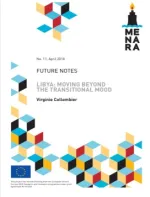Libya: Moving Beyond the Transitional Mood

MENARA Future Notes nº. 11
The Libyan Political Agreement (LPA) signed in December 2015 was to be a transitional agreement to establish a unified, legitimate government and organize political life prior to the finalization of the constitutional process allowing for the election of a new legislative authority. Yet the continued opposition of key constituencies to the agreement – notably from eastern Libya, within the Tobrukbased House of Representatives (HoR) and the self-styled Libyan National Army (LNA) commanded by Field Marshal Khalifa Haftar – has undermined hopes that the agreement could present a way out of the conflict. More than two years after the signing of the LPA, political and institutional divisions persist, accompanied by outbreaks of violence and localized conflict. Despite the fact that the majority of the Constitutional Drafting Assembly (CDA) voted in favour of a draft constitution in July 2017, implementation procedures for its official adoption have stalled.
(...)